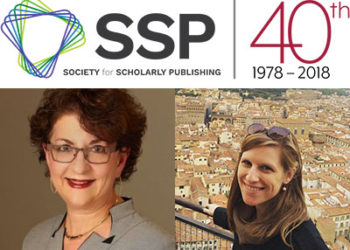Understanding – and meeting – the needs of the next generation of scholarly publishing professionals, is critical if the Society for Scholarly Publishing (SSP) is to continue to thrive. To help celebrate the Society’s 40th anniversary, Alice Meadows and I put out a call on the SSP listserv for early career professionals to tell us where they hope to be in 10 years time and how SSP can support them. The responses we received were thoughtful and thought-provoking. The contributors came from a variety of backgrounds — publishers and non-publishers, small and large, not-for-profit and commercial organizations — and positions. And although each brought a different perspective to the questions we posed, there were also some clear themes:
- Real progress on diversity and inclusion, with scholarly communication and academia, is essential for us to thrive over the next 10 years and beyond. SSP’s initiatives to date are recognized and appreciated, but we can and should do more.
- Change and uncertainty will be a constant for these early career professionals. SSP can help them build successful careers through fostering networks and building transferable skills.
- Technology will continue to be a major driver in the industry. In the short term, this means improving the interoperability of everything we’ve built over the past 20 years but in the career spans of these young professionals, further revolutions are coming as technologies such as artificial intelligence and machine learning become both powerful and ubiquitous.
Encouragingly, all contributors see SSP — and themselves! — as part of the solution. As members of the current leadership of the Society, we look forward to working with this next generation, both to support them and to learn from them. Together, we can help ensure that SSP continues to be “the community for everyone engaged in scholarly publishing”.
Responses are listed in alphabetical order:
Alisa C.D. Clark, Copyeditor, Cell Press

In 10 years’ time, the field of scholarly publishing may look entirely different. On the other hand, we may still be saying that, and nothing at all may have changed. At a time like this, in an industry like ours, there’s no way of knowing where I might land. What I do know is that I can’t pivot unless I stay on my toes — keeping up with new developments, disruptive technologies, and industry-wide trends on a month-to-month, year-to-year basis.
What will that “keeping up” look like for me? I do plan to advance within my institution; I’m quite committed to Cell Press, to our mission and our culture, and I hope to stay here and serve our scientific community at an increasingly meaningful level. In 10 years, I’d love to be in a position to launch new initiatives, or to do something really exciting that generates enthusiasm about new and groundbreaking science on a much larger scale. That will require — well, who knows? But without an organization like SSP building bridges between individual organizations, disciplines, and skill sets, it would be easy to fall behind.
Individual institutions can — and do — innovate, but really understanding the changing landscape of a diverse and complex field necessitates a broader view. The kind of discussions SSP facilitates are at the heart of its appeal. I’m a pretty new member, but I already eagerly await new Scholarly Kitchen posts (and regularly break that fundamental internet rule, “don’t read the comments.” You’re all so helpful here!). Connecting with others in this field — from industry veterans to fellow young-and-full-of-hope newcomers — is one of the most valuable things I’ve been able to do in my career so far, and I’m grateful to SSP for helping me connect to others who share my passion and vocation.
Camille Gamboa, PR, Public Affairs & Conventions Manager, SAGE Publishing

In 2028, I hope I’m still working for a mission-driven company, a place where I can take pride knowing that my work publicizing research resources and translating scholarship for public consumption helps transform society and creates a hunger for reliable information. I hope that my responsibilities will have expanded and my team grown because there is so much we can do in this arena.
I believe that another 10 years of work as a communications professional can meet this bushy-tailed ambition. But my hopes are tempered by my reality as I listen to the happy babbles of my seven-month-old playing next to me.
We early career publishers are also in the early(ish) stages of our own personal journeys. The long road is often bumpy as our industry faces never-before-dreamed-of disruptions, and it parallels equally complex personal journeys. We might pretend that the personal and professional don’t overlap, but they do, now more than ever in our always-connected world. How can we find success in both? I believe SSP can help.
SSP can advocate for family-friendly work policies and even informal norms that make it easier – not harder – to combine work and family life in ways that are appropriate. At a time when unequal treatment of women (pay, leadership opportunities, etc.) has become starkly outlined, and men can be discriminated against for prioritizing family, we need to come together as a professional community to destigmatize and then institutionalize longer family leave, flexible work schedules, and a more supportive work/life environment.
While the quest for work/life balance is hardly unique to publishing, this is the space that we work – and live – in, a space that publishes the research demonstrating the benefits of such a balance. Why not work together under the leadership of SSP to create change that’s within our reach? This, I believe, would be one of the most valuable gifts we could give to early-career SSP members.
Sai Konda, Ph.D., Senior Managing Editor, Global Journals Development, American Chemical Society

As intriguing it is to think about what the future may hold, I am tempted to ask the same question from a different point back in time. In 2008, as a Master’s student in Chemistry thinking about a Ph.D. program and beyond, a publishing career never featured in the wildest of plans. However, I am thankful for this serendipitous career transition and the accompanying opportunities. As an early-career professional, I have recently been exposed to leadership, strategy and staff-management responsibilities in the workplace. Thinking ahead, my hope is to build on these experiences and progress towards a senior leadership role in scholarly publishing. This could be in academic journals, wherein lies my current association, or a different sector in the industry that allows for transferability of skills acquired in my current job. I believe that being involved with SSP can play a key role in helping me realize these goals. The Early Career Fellowship in 2017 opened new networking doors with professionals from diverse areas of publishing, a chance to learn more about the industry, and explore volunteering options at SSP. Taking a step further with the latter, I’m honored to co-chair the Early Career Sub-committee for the new term. I see this as an important milestone in not only being more involved with SSP, but as a valuable opportunity towards personal career development. I look forward to new challenges, and an exciting future in scholarly publishing!
Josh Lancette, Deputy Managing Editor, Entomological Society of America

I don’t know where I want to be in 10 years. Ten years ago, I wanted to be a doctor. Then I realized the thought of a needle makes me woozy, and the actual sight of one makes me pass out, so I decided to study English and go into publishing.
In 10 years, I likely will be a different person than I am today, and the publishing industry certainly is going to be different. That makes it hard to identify exactly where I want to be. What will the industry even look like? What opportunities will no longer be viable? What new opportunities will be available?I think this uncertainty is exactly why SSP is important and can help both the industry and me move forward into the future.
SSP does an admirable job of bringing together diverse voices, voices of people who are a lot smarter and wiser and more talented than me. Voices of people who are diverse in ethnicity, gender, age, knowledge, job function, and opinion. People with their fingers on the pulse of many different ideas, strategies, and trends.
I believe the success of the industry and, therefore, my own success, requires that these diverse voices are not only at the table, but also heard. It’s important for SSP to increase the range of voices and to create opportunities to empower those involved in the society, including making space for marginalized people and groups. By cultivating an inclusive environment and creating opportunities for members to listen and learn from others, SSP can help facilitate a successful transition into an uncertain future, both for me personally and for the industry as a whole, ensuring that we reach a better place in 10 years.
Mariya Maistrovskaya, Institutional Repositories Librarian, University of Toronto Libraries

As a library school graduate, much of the program was about handling published research — developing collections, managing subscriptions, searching databases, etc. That’s why finding myself at the very beginning of the publishing process, as I began supporting University of Toronto faculty and students in their journal publishing and repository initiatives, presented a new and exciting set of challenges.
And with them came identity questions — what is and what isn’t publishing, and how is library publishing different? As a librarian valuing open and equitable access to information, I like to think of publishing very broadly, even if simplistically, as making research public. My goal as part of this community is to continue supporting this movement: locally, by helping bring ownership of knowledge creation back to researchers; nationally, through the Canadian community of practice; and globally, by contributing to open publishing platform and open repository initiatives. Scholarly publishing is undergoing big changes, and in 10 years time I hope to be part of a vibrant, connected, and collaborative community that follows best practices in delivering high quality research as broadly and openly as possible.
This is my very first year with SSP as a 2018 fellow. I look forward to joining its incredible network of stakeholders, finding collaborators, and contributing to committees and initiatives. Professional siloing is sadly among the barriers to advancing scholarly communication, and I see SSP’s greatest strength in its diverse and highly experienced membership that offers a variety of perspectives and helps forge connections through networking, training, and mentorship.
Ben Mudrak, Strategic Partnerships Director, Research Square

In some ways, it’s hard to imagine what I’ll be doing 10 years from now, considering that 10 years ago I was spending my days growing bacteria in a lab! Looking forward, the main thing I hope to be doing is continuing to help improve how research is communicated. I am humbled by the massive (and increasing) output of research from around the world. But I also see room for improvement, and I want to be a part of new solutions.
From a career standpoint, I hope to continue to gain new skills and make new connections that will help me more broadly impact the scholarly communication process. I want to tightly integrate with industry-wide efforts to set standards and implement new technology, whether it’s an existing one like ORCID or something new such as blockchain, and make personal contributions to the next phase of publishing.
SSP can help with this kind of professional growth by continuing to focus on networking. The Annual Meeting provides plenty of great opportunities, but you need to have built your network a bit already to truly benefit. I would love to see an expansion of mentorship opportunities for anyone who’s only attended a few meetings — that is, pairing up experienced, connected members with newer attendees, as is done with the Fellows. And while local meetings facilitate geographically-based connections, I would love to see interest- or role-based groups form, too. SSP represents a sprawling array of interests, so it can be overwhelming to find others in your same role. Expanded committee and task force opportunities will also help build beneficial connections, provided we continue to bring in fresh faces from diverse backgrounds.
SSP has presented me so many wonderful opportunities so far, and I look forward to what it will bring in 10 more years!
Ayesha Saldanha, Publishing Assistant, Journals, Oxford University Press

In journals publishing, we see a myriad of society clients and researchers unsure about where the industry is going and how they can conduct research, make it discoverable to their communities, and measure its impact quantitatively and qualitatively. Our power in advancing scholarship is to support our customers as they navigate those needs.
I came to my role in publishing from a background in customer service and have continued to find the service aspect of publishing a driving factor in my day-to-day. After all, we see readers, authors, and editors all as our customers, and the challenges of working their concerns into a strategy for growth is dynamic and rigorous. I envision continuing to be in client-facing roles for the years to come. Given the complexities our industry and the challenges our clients face, the support that SSP and the Scholarly Kitchen offer as a network of professionals will prove invaluable. To advance the pursuit of scholarly publishing is to advance the people in the industry, which is why I can appreciate the SSP mission.
I’ve highlighted a couple of key concerns that I see as both part of my future and our collective need to continue serving our customers, colleagues, and the scholarly record:
Technology: The amount of information stored in the academic record is surreal and energizing. In my role, we leverage citation and usage data to inform our journal growth strategies and we’re increasingly seeing ways to bring media attention into play. We also see opportunities in specialized innovations that can improve our services, like format-free submission and peer review recognition, all the while collecting meaningful data points that serve to evaluate every step in publication. It would be great to see these developments in a context that allows for collaboration and improvements to create better tools for our customers.
Inclusion: Both the academic community and the publishing industry face a reckoning with inclusion, as brutally but thoughtfully detailed in the recent Scholarly Kitchen testimonies. I’ve personally experienced a client commenting, with discomfort, after a meeting that the room — consisting of academics and publishers — was mostly white. By creating inclusion in our own industry, we can support greater inclusion in academia, and ultimately foster better research. SSP would do well to make itself known in communities across ethnic and socioeconomic backgrounds to lead change among ourselves and among our clients.


